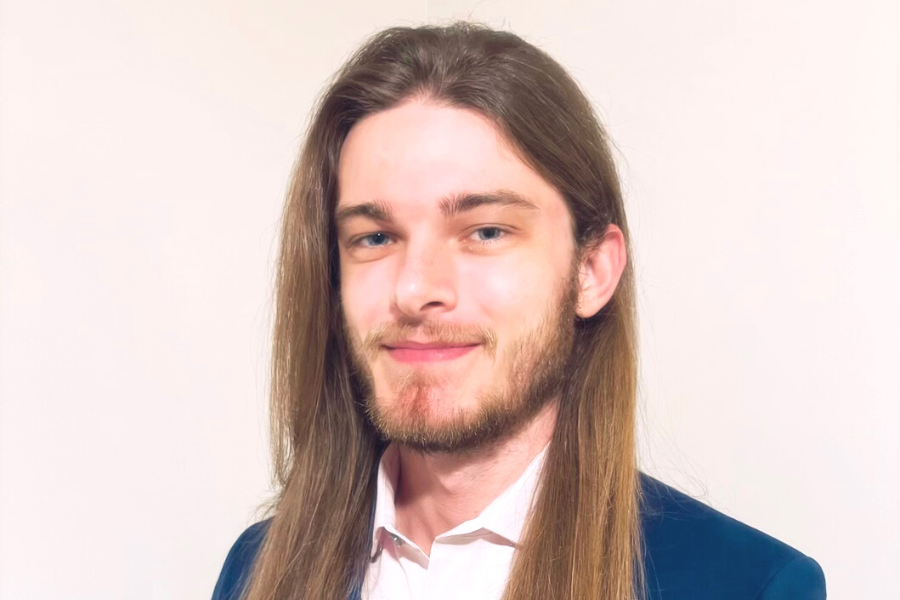Ethan Cissell

"Expanding the global knowledge pool"
College: Arts and Sciences
Degree Program: Ecology and Evolution
Degree: Doctoral
Awards: National Science Foundation Graduate Research Fellowship (2019); Florida “Protect our Reefs” Grants Program (2021); American Museum of Natural History Theodore Roosevelt Memorial Grant (2022)
Why FSU?
FSU has an outstanding program in Biology, particularly in Ecology and Evolution. Joining the Department of Biological Science at FSU was the clear choice for me in order to receive broad training in the field of ecology, alongside a robust specialization in trophic ecology and in the rigorous analysis of complex ecological datasets. In addition to this pedagogical excellence, it was evident while interviewing for the program that FSU was immensely cooperative, with the faculty of the biology department encouraging collaboration across the intra-department hierarchy and with other departments at FSU. The graduate student network within the department also played a major role in driving my decision to choose FSU for my PhD, as the graduate students were clearly committed to fostering a deeply supportive culture among both the immediate intra-department graduate cohort and the graduate student body at large.
Motivation to pursue a graduate degree
I have a longstanding (and ongoing) curiosity about the natural world, especially in the complex patterns we can find across scales of biological and ecological organization. This inherent curiosity motivated my pursuit of an undergraduate degree in the sciences, specifically in microbiology, at the University of Alabama. In addition to receiving broad scientific exposure and training spanning biology, geology, chemistry, and physics while at the University of Alabama, I had the opportunity to conduct research in an environmental microbiology laboratory. My time in this lab made it clear to me that I wanted to continue to pursue questions in environmental microbiology. More specifically, I discovered that I wanted to put myself in a position where I could ask and pursue my own questions and curiosities. Following many discussions with my undergraduate research advisor, I decided that pursuing a PhD would maximize my chances of turning my long-held curiosities into an intellectually rewarding career.
Importance and/or impact of research and work
I am an integrative ecologist and microbiologist interested in linking patterns across biological and ecological scales in a rapidly changing environment. Toward this broad goal, my research program integrates classic ecological frameworks and experimental approaches with modern techniques in molecular biology and bioinformatics to unite patterns across scales holistically--from genes to metacommunities. During my doctoral work at FSU, I created a unified multitrophic framework that connects interactive effects of scale-dependent variability in predation pressure (from both fishes and viruses) and mutualism (from gene-level metabolic coupling) with patterns in the metacommunity dynamics of coral reef benthic cyanobacterial mats, which are a growing threat to coral reef health globally. This work serves as an important baseline for incorporating indirect effects into microbial metacommunity theory. While contributing to more traditional and foundational questions in ecology, the products of my research are inherently translational and help guide contemporary conservation practices for the robust monitoring and management of cyanobacterial mat biomass on reefs. During my PhD pursuit, I extensively collaborated with local managers on the Caribbean island of Bonaire (at STINAPA Bonaire), where I conducted much of my dissertation research, and with managers at NOAA. I continue these collaborations in my current postdoctoral work at the University of North Carolina at Chapel Hill.
Career aspirations
Generally, I aspire to a career where I can continue to pursue my scientific curiosities while fundamentally contributing to environmental issues that I am passionate about, particularly the effects of ongoing global change on coral reef environments. I feel strongly that, despite deeply entrenched views in the field, academia is not the only career path that allows you to pursue these interests, and I am currently exploring all options—both academic and otherwise—toward finding the best-fit career that aligns with my above-stated goals.
Advice for anyone considering graduate school
I think the most important qualities to bring to your graduate education are a self-motivated drive and an openness to new opportunities that may not, at the surface level, immediately align with some of your preconceived ideas of what your graduate trajectory may have looked like. I found it was these unexpected and seemingly tangential opportunities given to me at FSU that were most rewarding for my own education and in preparing me for my career.
Accomplishments during graduate career
I have received many fellowships and grants over my graduate career at FSU, including
